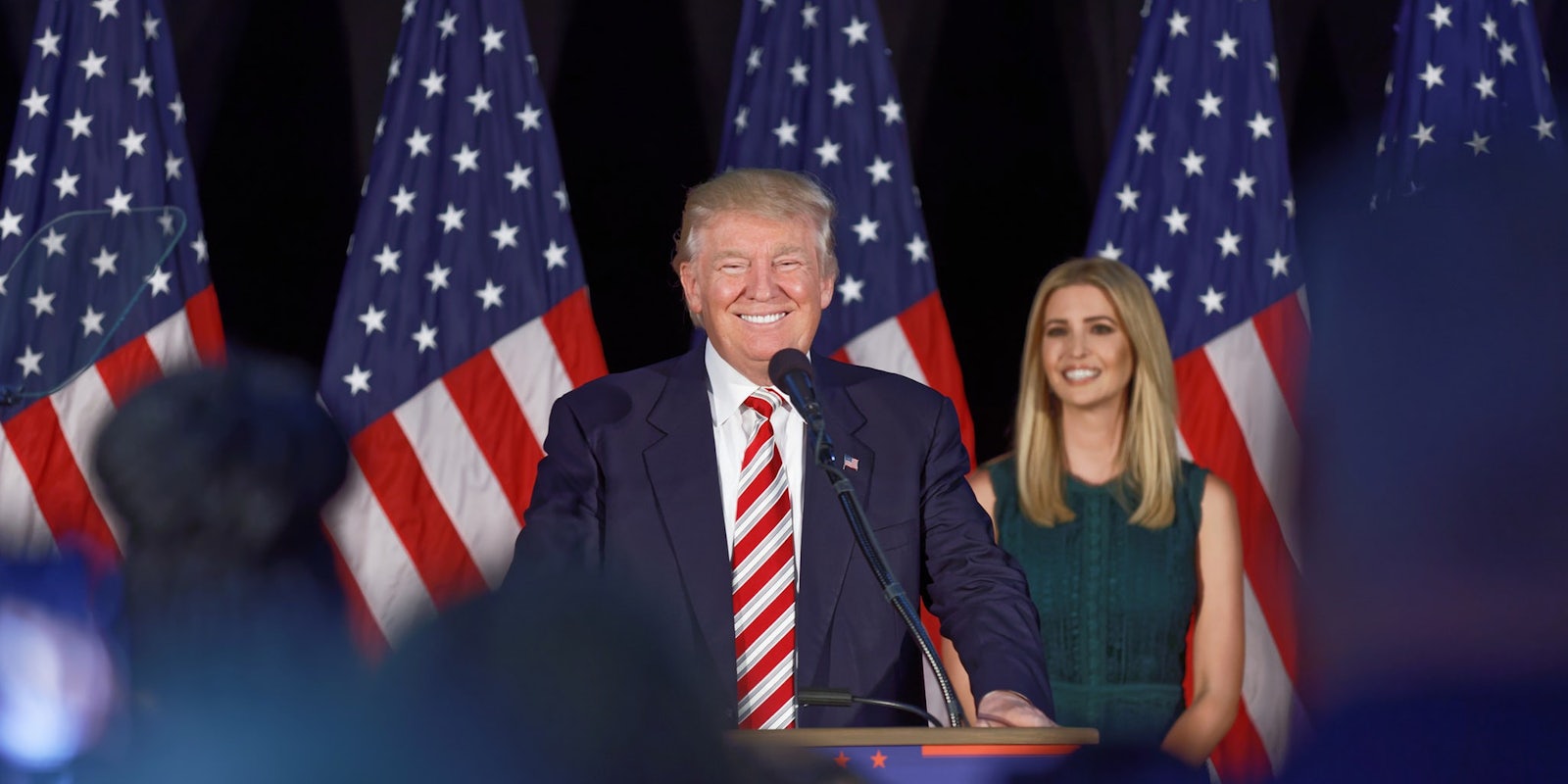Donald Trump will be the 45th president of the United States of America.
Trump’s unlikely win follows victories in a flurry of key swing states—as well Clinton strongholds—that propelled him to within reach of the 270 electoral vote threshold needed to secure the White House over Democratic challenger Hillary Clinton, bringing an end to a divisive, brutal election year.
The New York real estate mogul and former reality TV star trailed Clinton in the final national polls of the election season as well as in a handful of key battleground states, leaving him with few paths to victory. A win in Florida, however, bolstered his chances as Election Night wore on, ultimately resulting in his win with help from Ohio, Pennsylvania, and Wisconsin.
As the election map made itself clear over a long Tuesday night and early Wednesday morning, Trump’s critics responded with disbelief and desperation at the thought of a President Trump, whose incendiary rhetoric, embrace of conspiracy, and scorched-earth tactics left millions of Americans feeling as though the ground had fallen out from under them.
In his victory speech just before 3am Wednesday morning, Trump vowed to begin the process of healing a divided nation.
“Working together, we will begin the urgent task of rebuilding our nation and renewing the American dream,” Trump said, embracing a tone not often seen on the campaign trail.
“It’s time for us to come together as one united people. It’s time,” Trump added. “I pledge to every citizen of our land that I will be president for all Americans. And this is so important to me.”
When Trump launched his presidential campaign on June 16, 2015, many discounted his candidacy as a sideshow to the “serious” politicians in the Republican primary field. Few knew that Trump would set the tone for America’s discourse for the next 16 months when he called Mexicans immigrants “rapists,” while some, he assumed, “are good people.”
That stance on immigrants would become the centerpiece of his campaign, with promises to “build the wall” along the U.S.–Mexico border serving as a rallying cry for an increasing number of voters anxious about an influx of foreigners. He would later, after a series of terrorist attacks in the U.S. and abroad, vow to block all Muslims from entering the U.S.—a position that has changed multiple times over the course of the election but remains part of his platform.
Trump would go on to defeat all 16 of his GOP primary opponents after winning 41 state contests and more than 14 million votes.
Trump, who has never held public office or served in the military, became the consummate outsider candidate, particularly among blue collar white voters who saw his candidacy as an opportunity to shatter the status quo in Washington, D.C., which has buckled under nearly a decade of partisan gridlock.
Trump’s candidacy was also defined by his most outspoken supporters who embraced what they saw—and championed—as a white nationalist stance, with veiled and overt racism, xenophobia, and anti-Semitism. This brand of rhetoric, sometimes echoed by Trump himself, inspired Clinton’s biggest gaffe of the campaign, when she dubbed “half” of Trump’s supporters a “basket of deplorables”–a name Trump supporters would embrace with pride, a middle finger to Clinton and her fans.
At times, it seemed as though Trump’s campaign had barreled completely off the rails. The first came during the Democratic National Convention at the end of July, when he attacked the Muslim Gold Star family of a fallen U.S. soldier. Khizr Khan, the soldier’s father, delivered a striking rebuke of Trump during the DNC.
The second came on Oct. 7, when the Washington Post published a 2005 Access Hollywood tape in which Trump is heard boasting of his ability to kiss and grope women with impunity because of his celebrity.
Alas, it would be Clinton’s scandal, not Trump’s controversies, that would evoke the winds of history ahead of Election Day.
Just 11 days before the election, FBI Director James Comey told Congress that the agency would renew its investigation into Clinton’s use of a private email server during her time as secretary of state after discovering some 650,000 emails on a laptop used by Anthony Weiner, the estranged husband of Clinton aide Huma Abedin. Weiner is under investigation for allegedly sending sexts to an underage girl.
Clinton’s poll numbers tanked earlier in the summer after Comey announced that he would not recommend charges against Clinton despite the existence of classified material in emails sent over her server. And so they would again, closing her comfortable lead over Trump to within low single digits. Ultimately, the FBI found no new information on which to pursue further investigation of Clinton, who hoped to become the first woman U.S. president.
Now, America gets to learn what it means to “make America great again.”
